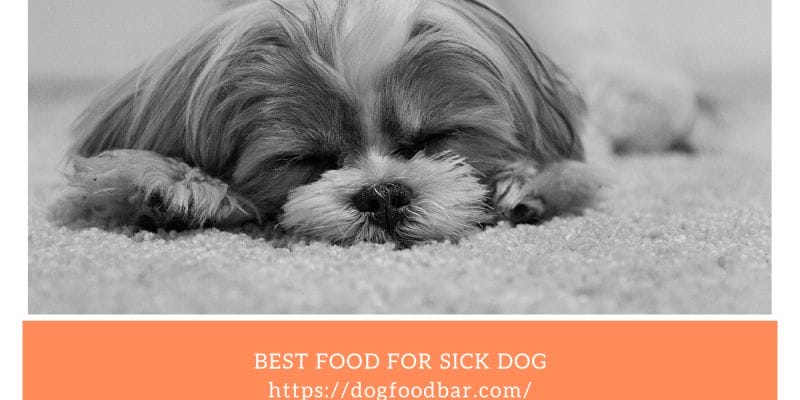Best Food For Sick Dog
Nourishing Your Ailing Pup: A Guide to the Best Foods for a Sick Dog

Introduction:
When our furry companions fall ill, it’s crucial to provide them with the right nourishment to aid in their recovery. Just like humans, dogs can lose their appetite when unwell, making it essential to choose foods that are not only enticing but also easy on their sensitive stomachs. In this guide, we’ll explore the “Best foods for sick dog”, focusing on nutrition, palatability, and ease of digestion.
“Best Food For Sick Dog”
Boiled Chicken and Rice: The Classic Combo
Boiled chicken and rice have long been recommended for dogs with upset stomachs. The bland nature of this combination is gentle on your dog’s digestive system, and the lean protein from chicken helps in muscle repair. Additionally, rice provides a easily digestible source of carbohydrates, offering a quick energy boost without overwhelming your pup’s stomach.
Pumpkin Puree: A Digestive Aid
Canned pumpkin puree, not to be confused with pumpkin pie filling, is an excellent option for dogs experiencing gastrointestinal distress. Rich in fiber and low in fat, pumpkin can help regulate your dog’s digestion by firming up loose stools or easing constipation. The soluble fiber content also promotes a healthy gut environment.
Low-Fat Cottage Cheese: Gentle Protein Source
For dogs with a reduced appetite, low-fat cottage cheese can be a tasty and easily digestible source of protein. The protein content is crucial for maintaining muscle mass, especially when a dog’s activity level may be compromised due to illness. Be sure to choose a low-fat option to avoid any unnecessary strain on your pup’s digestive system.
Bone Broth: A Nutrient-Rich Elixir
Bone broth is a powerhouse of nutrients that can be beneficial for a sick dog. Packed with amino acids, vitamins, and minerals, bone broth supports the immune system and aids in hydration. The warm, comforting nature of bone broth can also encourage a reluctant eater to consume much-needed liquids.
Hill’s Prescription Diet i/d: Vet-Recommended Nutrition
In cases where a dog’s illness requires a specialized diet, Hill’s Prescription Diet i/d is often recommended by veterinarians. This prescription food is formulated to be highly digestible, making it easier for dogs to absorb essential nutrients during times of illness. Always consult with your veterinarian before introducing any prescription diet.
Baby Food: Gentle and Palatable
Unseasoned baby food, particularly jars of pureed meat such as chicken or turkey, can be a palatable option for sick dogs. Ensure that the baby food does not contain any harmful additives like onion or garlic, which can be toxic to dogs. The smooth texture makes it easy for dogs with reduced appetite or dental issues to consume.
Symptoms of a Sick Dog
Our beloved furry companions, though unable to articulate their ailments verbally, communicate their distress through subtle signs. Being attuned to these symptoms is pivotal for responsible pet ownership. Here’s a quick guide to help you decipher the language of your sick
Behavioral Changes: Pay close attention to shifts in behavior such as lethargy, reluctance to play, or a sudden withdrawal from activities they once enjoyed. These could be indicative of underlying health issues.
Appetite and Thirst :A sudden decrease in appetite or an increase in thirst might signal digestive problems, dental issues, or metabolic imbalances. Monitoring their eating and drinking habits is key.
Bathroom Habits: Changes in urine or stool patterns should raise concerns. Diarrhea, constipation, or noticeable changes in color and consistency warrant a closer look and a potential vet visit.
Weight Fluctuations: Unexplained weight loss is a red flag. While it could be linked to various conditions, it’s crucial to investigate and rule out serious health issues.
Respiratory Distress: Coughing, labored breathing, or excessive panting can signify respiratory or cardiac problems. Prompt attention is vital, especially if these symptoms persist.
Coat Condition: The condition of your dog’s coat reflects their overall health. Excessive shedding, dullness, or the appearance of skin abnormalities may be indicative of underlying issues.
Pain-Related Signs: Dogs may instinctively hide pain, so be vigilant for signs such as limping, reluctance to be touched in specific areas, or vocalizations when certain body parts are manipulated.
How do you cure a sick dog and Best food for sick Dog?
Tender Care: Nurturing Your Ailing Canine Companion Back to Health
When your furry friend falls ill, your role as a pet parent extends beyond affection to thoughtful and attentive care. Navigating the path to recovery for a sick dog requires a combination of patience, vigilance, and informed decision-making.
Curing a sick dog requires a multi-faceted approach, encompassing professional veterinary care, attentive medication management, and thoughtful adjustments to their environment and diet. By combining these elements with love and patience, you can play a crucial role in your canine companion’s journey back to health. Always consult with your veterinarian for personalized advice tailored to your dog’s specific needs.

“What to Feed a Dog With No Appetite”
7 Ways To Feed Sick Dog
A lack of appetite in our canine companions can be concerning for pet owners. When your dog turns their nose up at their usual meal, it’s essential to explore alternative options that entice their taste buds and ensure they receive the nutrition they need.
Feeding a sick dog requires a thoughtful and patient approach. By incorporating these 7 Ways gentle methods into your caregiving routine, you not only provide essential nutrition but also contribute to the overall well-being and comfort of your canine companion.
Introduce Novel Flavors: When faced with a picky eater, consider introducing novel flavors to spark interest. Rotating protein sources or adding a dash of low-sodium broth to their food can make meals more enticing.
Hand-Feeding: Sometimes, the act of hand-feeding can make a difference. Offer small portions directly from your hand, establishing a positive association with eating. This method is particularly useful for dogs experiencing stress or anxiety.
Warm, Aromatic Meals: Warming your dog’s food can enhance its aroma, making it more appealing. Be cautious not to make it too hot, and always test the temperature to avoid discomfort.
High-Value Treats: Incorporate high-value treats into your dog’s meals to elevate the overall appeal. Mix small amounts of lean meat or special dog treats into their regular food to add a flavorful twist.
Prescription Diets: Consult your veterinarian about prescription diets designed for dogs with decreased appetite. These diets are formulated to be highly palatable and nutritionally balanced, addressing specific health concerns your dog may be facing.
Small, Frequent Meals: Instead of traditional mealtimes, offer small and frequent meals throughout the day. This approach can be less overwhelming for a dog with a diminished appetite and helps maintain their energy levels.
Nutritional Supplements: Explore nutritional supplements recommended by your veterinarian. These can include canine-friendly probiotics, omega-3 fatty acids, or meal toppers designed to enhance flavor and nutrition.
Conclusion:
When tending to a sick dog, providing the right nutrition is paramount for a speedy recovery. Whether opting for the time-tested boiled chicken and rice or exploring nutrient-rich options like bone broth, tailoring your dog’s diet to their specific needs is essential. Always consult with your veterinarian to determine the most suitable and best food for sick Dog course of action, and remember that patience and love are as crucial as the right food when nursing your furry friend back to health
.Caring for a dog with a waning appetite requires creativity and a patient approach. Experiment with different strategies, and don’t hesitate to consult with your veterinarian for personalized advice. By understanding your dog’s preferences and addressing any underlying health issues, you can gradually restore their appetite and ensure they enjoy a balanced and nourishing diet.
FAQs
1. How can I get my dog to eat when sick?
When coaxing a sick dog to eat, consider offering highly palatable, easily digestible foods. Experiment with warming their meals to enhance aroma and appeal. Hand-feeding or introducing novel flavors can spark interest. High-value treats and prescription diets recommended by your veterinarian can also be effective. Ensure a calm eating environment and consult with your vet for personalized advice.
What is recovery food for dogs?
Recovery food for dogs focuses on easily digestible, nutritious options. Boiled chicken or turkey, plain rice, and canned pumpkin are often recommended. These foods provide essential nutrients, are gentle on the stomach, and help with digestion. Prescription diets formulated for recovery may also be suggested by veterinarians, addressing specific nutritional needs based on the dog’s health condition.
What makes a dog sick quickly?
Several factors can lead to a rapid decline in a dog’s health. Ingesting toxic substances, such as certain plants, human foods, or chemicals, can cause swift illness. Additionally, infectious diseases, parasites, and sudden changes in diet can contribute to a dog becoming sick quickly. Being mindful of their environment and providing a balanced diet is crucial to prevent these rapid health declines.
Can dogs recover from sickness?
Yes, dogs can recover from sickness with proper veterinary care and attentive home management. Timely intervention, including accurate diagnosis, prescribed medications, and a suitable diet, significantly contributes to a dog’s recovery. Following the veterinarian’s advice, monitoring their progress, and providing a comfortable, stress-free environment enhances the chances of a full recovery.
How long does dog sickness last?
The duration of dog sickness varies depending on the specific illness. Some conditions may resolve within a few days with proper treatment, while others may require a more extended recovery period. Regular veterinary check-ups, adherence to prescribed medications, and a supportive home environment are key factors influencing the duration of a dog’s illness.
Can I bathe a sick dog?
Bathing a sick dog depends on the severity of their illness. Generally, it’s advisable to avoid bathing dogs with a fever or respiratory issues, as it can add stress. However, for mild illnesses, a gentle bath may be acceptable. Always consult with your veterinarian before bathing a sick dog to ensure it aligns with their specific health needs and won’t exacerbate their condition.
YOU MAY ALSO LIKE THIS : CAN MY DOG EAT VANILLA ICE CREAM
WRITTEN BY ANAM AHMED







